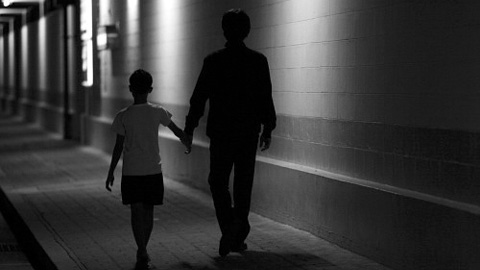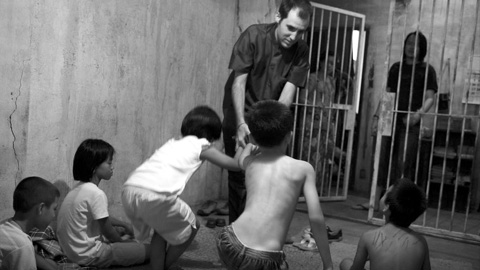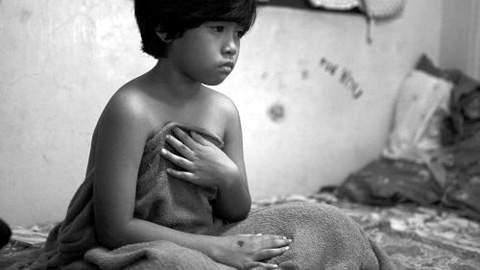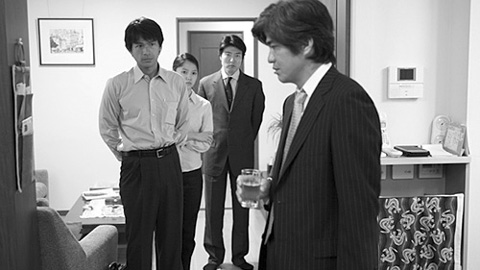Children of Darkness
- Year
- 2008
- Original title
- Yami no Kodomotachi
- Japanese title
- 闇の子供達
- Alternative title
- Children of the Dark
- Director
- Cast
- Running time
- 138 minutes
- Published
- 18 September 2012




by Mike Dillon
Junji Sakamoto’s Children of Darkness is the kind of film that is impossible to enjoy but impossible to dismiss. It will doubtlessly polarize viewers and provoke debates about whether its depictions of the horrors of child prostitution add to its overall narrative impact, or cheapen it. The film has numerous dramatic shortcomings; however, it is difficult to determine concretely if the film’s earnestness and emotional rawness benefit the film in spite of those shortcomings, or are what contribute to them most. Interpretations will likely vary depending on each viewer’s reaction and sensitivity to the issues being portrayed.
Nanbu (Eguchi) is a Japanese journalist living in Bangkok who begins investigating a story about an organ harvesting enterprise targeting impoverished local children. While recognizing the phenomenon to be global in scale, Nanbu pursues information that links the illegal organ traffickers directly to Japan – specifically, to Japanese families desperate to sidestep the lengthy waiting periods for life-saving procedures for their ailing children. Before long, the investigation takes us into the world of child prostitution, where pre-teen boys and girls are kept in pens and forced to service customers. The film focuses on a particular brothel, from which the occasional child is sold for his or her organs, thereby presenting various forms of child slavery and exploitation as overlapping realities.
From here, the film follows a series of sub-narratives: an under-resourced NGO must mobilize when they learn a local child has been sold into slavery; a Japanese family in the midst of arranging one such operation is informed that a Thai child will be murdered in the process; an AIDS-infected little girl is discarded by the brothel and forced to fend for herself. These storylines are periodically interrupted by episodes that depict the repulsive goings-on at the brothel itself, as the children are abused by various clients – that is, until their sexually-contracted diseases become too difficult to conceal, after which they are literally thrown out with the trash.
Children of Darkness is a film determined to shed light on a serious social problem, and while those operating the child-brothel are necessarily presented as unambiguously evil caricatures, elsewhere the film eschews black and white portrayals in intriguing ways. One of the film’s great strengths is a willingness to address the complexity of local politics and corruption and to use its protagonists as vehicles for exploring certain moral grey zones. In one memorable scene, the Japanese family – whose son is soon to undergo a heart transplant – is confronted with the truth about their boy’s “donor”; the reality, however, that he requires an immediate operation to survive compels the despairing parents to weigh their love for their child against the life of an anonymous child abroad. Children unfortunately sidesteps opportunities to explore the wider geopolitical patterns of child slavery by symbolically reducing the issue to one conflicted family, but to the film’s credit, this is handled sympathetically and with due delicacy.
The film also poses challenging ethical questions concerning the moral dimensions of journalism and its role in exposing social evil. Nanbu insists that his professional obligation is merely to report the story, not intervene in it. From his standpoint, he must allow a child to fall victim to a criminal system, so that he may fully verify that system’s existence and utilize the full power of the media to draw attention to it. His knowledge, however, that he is effectively condemning a child to die in order to acquire that verification is a heavy burden and the cause, we are led to believe, of his heavy drinking and self-destructive tendencies. The decision to sacrifice one innocent life for the proverbial “greater good” is thrown into question by Keiko (Miyazaki), a Japanese volunteer for the NGO who joins forces with Nanbu and serves as his ideological foil. Together, the two form a familiar dynamic – the fiery but naive idealist and the jaded pro – who represent opposing approaches in their search for justice, between immediate action at a small level and protracted action at a larger one. The film offers no easy reconciliation between philosophies: both are wrong, and both are right.
What will inevitably dominate conversations about Children of Darkness are its depictions of child rape, which are persistent and graphic and will outrage some viewers. Others may simply disagree over the narrative efficacy of such scenes and whether they are necessary elements to the film’s impact or exist merely for shock value. In one sickening scene after another, slimy foreigners force themselves upon the children. This review does not deny the emotional power of these images, but objects to how they are used within the overall structure of the narrative, with each successive scene involving a different foreign national demanding a different sex act. This heterogeneity of abusers/abuses thematically reinforces the global nature of the problem, but as a narrative gimmick, it is tasteless and exploitative. Such sequences ask too much of their child actors, who for the most part have no lines of dialogue.
The film is otherwise dramatically unfocused as it jumps between storylines: for example, the segment involving a child slowly dying of AIDS gradually loses its relevance to the primary narrative and appears included solely to be upsetting to viewers. Further, the parallel efforts of the journalists and the NGO culminate in unforeseen revelations about two characters – one major, one minor – in the final act. These twist endings, some may argue, exploit the horrors of their subject matter by catering unnecessarily to the conventions of the thriller genre. Nanbu (an overacting Eguchi) is unsatisfying as a character because he remains such an enigma throughout the film; there are passages in the film that suggest Nanbu’s actions – particularly his final ones – symbolize an indictment of Japanese society’s complicity in the social misery of other nations. But because Nanbu’s own Japaneseness is questionable (he has fully emigrated to Thailand, where he openly states he prefers living), the exact intentions of the filmmakers remain unclear here.
Children of Darkness, ultimately, is powerful and disturbing, and its dramatic failures are likely to be secondary concerns for viewers. For the non-squeamish, this film is worth a look if only for the heated conversations the film will incite about child prostitution and the appropriateness of representing child endangerment cinematically.